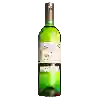
Winery Comte de LibuzacBergerac Blanc Sec
This wine generally goes well with
Details and technical informations about Winery Comte de Libuzac's Bergerac Blanc Sec.
Discover the grape variety: Oeillade blanche
It is said to originate from the south of France, most certainly from Provence. Today, it is practically no longer multiplied, although it is registered in the Official Catalogue of vine varieties, list A1. - Synonyms: oeillade blanche, aragnan or araignan blanc, grosse clairette, papadoux, milhaud blanc in the Tarn. Note that many grape varieties have picardan as a synonym. The one described here has nothing in common with cinsaut and it is not the white form of oeillade noire (for all the synonyms of the grape varieties, click here !).
Informations about the Winery Comte de Libuzac
The Winery Comte de Libuzac is one of of the world's greatest estates. It offers 5 wines for sale in the of Bergerac Sec to come and discover on site or to buy online.
The wine region of Bergerac Sec
The wine region of Bergerac Sec is located in the region of Bergerac of South West of France. Wineries and vineyards like the Château Tour des Gendres or the Château Barouillet produce mainly wines white, red and sweet. The most planted grape varieties in the region of Bergerac Sec are Muscadelle, Cabernet-Sauvignon and Merlot, they are then used in wines in blends or as a single variety. On the nose of Bergerac Sec often reveals types of flavors of citrus, pear or oil and sometimes also flavors of non oak, floral or cheese.
The wine region of South West
The South-West is a large territorial area of France, comprising the administrative regions of Aquitaine, Limousin and Midi-Pyrénées. However, as far as the French wine area is concerned, the South-West region is a little less clear-cut, as it excludes Bordeaux - a wine region so productive that it is de facto an area in its own right. The wines of the South West have a Long and eventful history. The local rivers play a key role, as they were the main trade routes to bring wines from traditional regions such as Cahors, Bergerac, Buzet and Gaillac to their markets.
The word of the wine: Barrel
Bordeaux barrel of 225 litres, used to determine the tonneau (unit of measurement corresponding to four barrels, or 900 litres).













